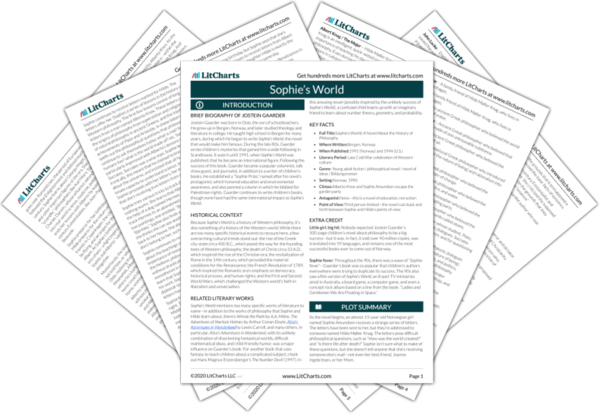Summary
Analysis
It’s May 16, andSophie and Joanna have planned to go camping. Sophie hasn’t heard from Alberto in a few days. Sophie and Joanna walk into the woods outside their town, with Sophie’sMom’s permission. Out in the woods, Sophie takes Joanna to the lake. She doesn’t tell Joanna that she’s been there before, since this would involve explaining Alberto Knox.
As the novel goes on, we see Sophie taking on roles of leadership. Here, for example, she’s clearly leading Joanna, and not the other way around: Sophie’s been to the cabin, and Joanna hasn’t. This reflects her increasing sense of self-control and adventurousness.
Themes
Joanna and Sophie sneak into the cabin, where they find a pile of postcards. Sophie says she “knows” about the postcards, and Joanna deduces that Sophie has been to the cabin before—Sophie admits she’s right.
Sophie isn’t a very skillful liar, apparently. The fact that Joanna joins Sophie’s experience of the cabin and the letters seems to make it less fantastical and more “real.”
Themes
Joanna reads one postcard. The postcard, addressed to Hilde, explains that “Dad” is under military command in Lebanon, and won’t be able to travel to Hilde’s birthday yet. The letter mentions “our mutual friend” (whom the reader understands to be Sophie herself). In another letter, the father tells Hilde that he plans to return to her on Midsummer Eve (June 23), which is shortly after Hilde’s birthday. In still another letter, the Dad mentions Sophie and Joanna by name, saying they can be of help to Hilde. Joanna finds this disturbing.
There appears to be a separate conversation going on between Hilde and her mysterious father, paralleling the conversations between Sophie and Alberto. Joanna and Sophie have no idea what to make of this figure, who seems to have the power to manipulate their entire world. In a way, it’s appropriate that Sophie should become aware of Hilde’s father at this time, since she’s just learned about the Aristotelian god, the “cause” of the entire universe.
Themes
Joanna and Sophie try to understand what’s going on. Joanna notices the large brass mirror that hangs in the cabin. Joanna senses that the mirror is somehow special, and begins taking it down from the wall (even though she doesn’t yet know about how Sophie’s reflection winked at her earlier).
The brass mirror becomes more important and mystical—such that even Joanna senses that it’s special, and thinks it’s appropriate to take.
Themes
Get the entire Sophie’s World LitChart as a printable PDF.

Joanna and Sophie leave the cabin with the brass mirror and spend the rest of the day camping in the forest. When Sophie gets home, she shows Mom the mirror. She also watches TV and sees news about Norwegian forces stationed in Lebanon. She feels exceptionally grateful to be living in a peaceful country like Norway, not a war-torn country like Lebanon. Afterwards, Sophie hangs the mirror in her room, and finds that there’s a new envelope waiting for her.
As Sophie continues learning about philosophy, she becomes more aware of her world—not just her home and her town, but her country, and her country’s relationship with the rest of the world. This also brings up a point that Gaarder addresses only briefly. The study of philosophy may seem crucial for personal growth, but it also requires a relatively stable life. If one is going hungry or living in a warzone, it’s hard to stay focused on Aristotle.
Themes












